537 start with E start with E
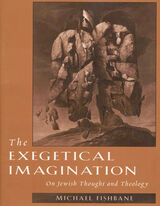
Exegesis--interpretation and explanation of sacred texts--is the quintessence of rabbinic thought. Through such means and methods, the written words of Hebrew Scripture have been extended since antiquity, and given new voices for new times. In this lucid and often poetic book, Michael Fishbane delineates the connections between biblical interpretation and Jewish religious thought.
How can a canon be open to new meanings, given that it is believed to be immutable? Fishbane discusses the nature and rationale of this interpretative process in a series of studies on ancient Jewish speculative theology. Focusing on questions often pondered in Midrash, he shows how religious ideas are generated or justified by exegesis. He also explores the role exegesis plays in liturgy and ritual. A striking example is the transfer of speculative interpretations into meditation in prayer. Cultivation of the ability to perceive many implicit meanings in a text or religious practice can become a way of living--as Fishbane shows in explaining how such notions as joy or spiritual meditations on death can be idealized and the ideal transmitted through theological interpretation. The Exegetical Imagination is a collection of interrelated essays that together offer new and profound understanding of scriptural interpretation and its central role in Judaism.

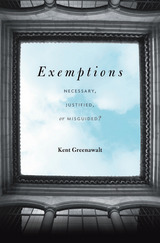
Should laws apply equally to everyone, or should some individuals and organizations be granted exemptions because of conflicting religious or moral convictions? In recent years, this question has become intensely controversial in America. The Supreme Court’s ruling on same-sex marriage, in particular, has provoked barbed debates about legal exemptions. At the core of these debates lies the question of whether basic values of equality and nondiscrimination are at odds with the right to live according to one’s religious beliefs.
In Exemptions: Necessary, Justified, or Misguided? Kent Greenawalt draws on his extensive expertise to place same-sex marriage and other controversies within a broader context. Avoiding oversimplification and reflecting a balanced consideration of competing claims and harms, he offers a useful overview of various types of exemptions and the factors that we should take into account when determining the justice of a particular exemption.
Through a close study of several cases, from doctors who will not perform abortions to institutions that do not pay taxes, Greenawalt demonstrates how to weigh competing values without losing sight of practical considerations like the difficulty of implementing a specific law. This thoughtful guide to exemptions will prove an invaluable resource as America struggles to come to terms with Obergefell v. Hodges, Burwell v. Hobby Lobby, and similar controversies. Exemptions shows how to reach the most just and desirable legal conclusions by respecting those who wish to live according to different fundamental values.
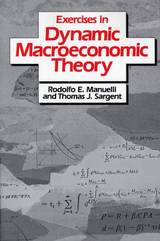

Life in a provincial capital is the subject of this study of Exeter during the Elizabethan and early Stuart ages. The author offers new insight into the way the English middle-class lived and the way in which Tudor policy achieved its aims in the provinces. During this period, Exeter was characterized by its self-sufficiency and by an oligarchical control over every aspect of its civic life. Wallace MacCaffrey describes a semi-autonomous world in itself, in which a small interlocked group of merchant families, related by marriage, kept tight control over the economy, politics, religion, education and social activities.
Taking the inclinations and actions of the local figures as his points of departure, the author discusses such great issues of the age as the Reformation, the war with Spain, and the monarchy, and examines how often they were pushed aside or subordinated to local affairs. Although the local citizen body had no part in national policy making, it was called upon to participate in carrying out the directives which came from London; it did carry out these policies, sometimes successfully, sometimes unsuccessfully.
In writing this detailed study, MacCaffrey has drawn on hitherto unused files from the records of the city.

Recent agricultural reforms in the People's Republic of China have generated great interest in the ability of the Chinese state, traditional and modern, to accommodate rapid economic change. Exhausting the Earth examines an earlier period—from the late Ming to the mid-Qing era marked by tremendous population growth, extension of the market, and increases in agricultural productivity.
Peter C. Perdue describes the relationship between agricultural production and state policies toward taxation, land clearance, dike-building; property rights, and agriculture in Hunan. During the late seventeenth and early eighteenth centuries, Hunan changed from a peripheral, sparsely populated region into a crowded, highly commercialized, grain-exporting province. State policies had stimulated this growth, but by the early nineteenth century serious signs of overpopulation, social conflict, and ecological exhaustion had surfaced. Local officials were conscious of these dangers, but the influence of the state on the economy was so weakened that they could not alter the ominous trends. The stage was set for the disintegration and rebellion of the nineteenth century. This in-depth study of official policies in one region over a long stretch of time illuminates the dynamics of official initiatives and local response.


New Orleans has always captured our imagination as an exotic city in its racial ambiguity and pursuit of les bons temps. Despite its image as a place apart, the city played a key role in nineteenth-century America as a site for immigration and pluralism, the quest for equality, and the centrality of self-making.
In both the literary imagination and the law, creoles of color navigated life on a shifting color line. As they passed among various racial categories and through different social spaces, they filtered for a national audience the meaning of the French Revolution, the Haitian Revolution of 1804, the Civil War and Reconstruction, and de jure segregation.
Shirley Thompson offers a moving study of a world defined by racial and cultural double consciousness. In tracing the experiences of creoles of color, she illuminates the role ordinary Americans played in shaping an understanding of identity and belonging.

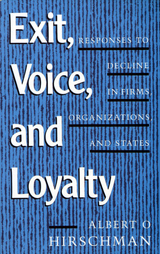
An innovator in contemporary thought on economic and political development looks here at decline rather than growth. Albert O. Hirschman makes a basic distinction between alternative ways of reacting to deterioration in business firms and, in general, to dissatisfaction with organizations: one, “exit,” is for the member to quit the organization or for the customer to switch to the competing product, and the other, “voice,” is for members or customers to agitate and exert influence for change “from within.” The efficiency of the competitive mechanism, with its total reliance on exit, is questioned for certain important situations. As exit often undercuts voice while being unable to counteract decline, loyalty is seen in the function of retarding exit and of permitting voice to play its proper role.
The interplay of the three concepts turns out to illuminate a wide range of economic, social, and political phenomena. As the author states in the preface, “having found my own unifying way of looking at issues as diverse as competition and the two-party system, divorce and the American character, black power and the failure of ‘unhappy’ top officials to resign over Vietnam, I decided to let myself go a little.”

“How do alien, faraway worlds reveal their existence to Earthlings? Let Donald Goldsmith count the ways. As an experienced astronomer and a gifted storyteller, he is the perfect person to chronicle the ongoing hunt for planets of other stars.” —Dava Sobel
Astronomers have recently discovered thousands of planets that orbit stars throughout our Milky Way galaxy. With his characteristic wit and style, Donald Goldsmith presents the science of exoplanets and the search for extraterrestrial life in a way that Earthlings with little background in astronomy or astrophysics can understand and enjoy.
Much of what has captured the imagination of planetary scientists and the public is the unexpected strangeness of these distant worlds, which bear little resemblance to the planets in our solar system. The sizes, masses, and orbits of exoplanets detected so far raise new questions about how planets form and evolve. Still more tantalizing are the efforts to determine which exoplanets might support life. Astronomers are steadily improving their means of examining these planets’ atmospheres and surfaces, with the help of advanced spacecraft sent into orbits a million miles from Earth. These instruments will provide better observations of planetary systems in orbit around the dim red stars that throng the Milky Way. Previously spurned as too faint to support life, these cool stars turn out to possess myriad planets nestled close enough to maintain Earthlike temperatures.
The quest to find other worlds brims with possibility. Exoplanets shows how astronomers have broadened our planetary horizons, and suggests what may come next, including the ultimate discovery: life beyond our home planet.

This is a major book about one of the luminaries of the golden age of Spanish literature. In spite of his great reputation, Lope de Vega is to most of us merely a name, in part because of the prodigious quantity and variety of his plays and other writings in verse and prose. Alan Trueblood's book does not pretend to survey all of Lope's works or to touch on all the events of his colorful career; yet it probes the mind and heart, and art, of Lope as no other study in English has done.
Trueblood pursues the artistic consequences of a key experience in Lope's life, the four-year love affair with Elena Osorio that terminated violently in 1587. (The rejected Lope, age twenty-five, wrote slanderous verses about Elena's family and associates, was jailed on charges of libel, and was sentenced to ten years' exile.) Notwithstanding his subsequent marriages and liaisons, his mounting literary fame in Spain and abroad, and his eventual dedication to the Church as a priest, for forty-five years this experience reverberated intermittently in his writings, culminating in the great prose dialogue La Dorotea. Trueblood's demonstration of the increasing objectivity and sympathy with which Lope treats Elena/ Dorotea--in ballads, in sonnets, in plays, in La Dorotea--is psychologically as well as aesthetically revealing.
Trueblood provides by far the fullest analysis and elucidation of Lope's masterpiece, La Dorotea, that it has ever received--and in the process he probes the nature of literary creativity, the symbiosis between personal experience and artistic expression, in contexts going well beyond Lope and his age. Because the book will appeal to many readers who do not know Spanish, all quotations have been translated into English.

Place and orientation are important aspects of human experience. Place evokes geography and culture and conjures up history and myth. Place is not only a particular physical location but an idea, a mental construction that captures and directs the human relationship to the world.
The distinguished contributors to this volume invite us to reflect on the significance of places, real and imagined, in the religious traditions they study and on how places are known, imagined, remembered, and struggled for. Whether looking at the ways myth and ritual reinforce the Yoruba's bond to the land or at Australian Aboriginal engagements with the origins of the created world, exploring Hildegard of Bingen's experience of heaven or myths of the underworld in contemporary American millennialism, listening to oral narratives of divine politics and deserted places of Rajasthan or investigating literal and literary images of the Promised Land, these essays underscore that place is constructed in the intersection of material conditions, political realities, narrative, and ritual performance.


In the years of rapid economic growth following the protest movements of the 1960s, artists and intellectuals in Japan searched for a means of direct impact on the whirlwind of historical and cultural transformations of their time. Yet while the artists often called for such “direct” encounter, their works complicate this ideal with practices of interruption, self-reflexive mimesis, and temporal discontinuity. In an era known for idealism and activism, some of the most cherished ideals—intimacy between subjects, authenticity, a sense of home—are limitlessly desired yet always just out of reach.
In this book, Miryam Sas explores the theoretical and cultural implications of experimental arts in a range of media. Casting light on important moments in the arts from the 1960s to the early 1980s, this study focuses first on underground (post-shingeki) theater and then on related works of experimental film and video, buto dance, and photography. Emphasizing the complex and sophisticated theoretical grounding of these artists through their works, practices, and writings, this book also locates Japanese experimental arts in an extensive, sustained dialogue with key issues of contemporary critical theory.

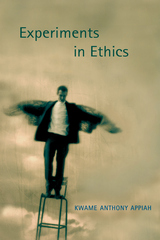
In the past few decades, scientists of human nature—including experimental and cognitive psychologists, neuroscientists, evolutionary theorists, and behavioral economists—have explored the way we arrive at moral judgments. They have called into question commonplaces about character and offered troubling explanations for various moral intuitions. Research like this may help explain what, in fact, we do and feel. But can it tell us what we ought to do or feel? In Experiments in Ethics, the philosopher Kwame Anthony Appiah explores how the new empirical moral psychology relates to the age-old project of philosophical ethics.
Some moral theorists hold that the realm of morality must be autonomous of the sciences; others maintain that science undermines the authority of moral reasons. Appiah elaborates a vision of naturalism that resists both temptations. He traces an intellectual genealogy of the burgeoning discipline of "experimental philosophy," provides a balanced, lucid account of the work being done in this controversial and increasingly influential field, and offers a fresh way of thinking about ethics in the classical tradition.
Appiah urges that the relation between empirical research and morality, now so often antagonistic, should be seen in terms of dialogue, not contest. And he shows how experimental philosophy, far from being something new, is actually as old as philosophy itself. Beyond illuminating debates about the connection between psychology and ethics, intuition and theory, his book helps us to rethink the very nature of the philosophical enterprise.
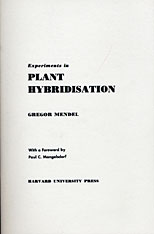


Explorations in Developmental Biology is a revolutionary departure from time-honored introductory texts. The book is based on the premise that the substance, concepts, and excitement of contemporary developmental biology are best communicated to students by using the same form in which they were first communicated to the scientific community — original research reports. But a simple collection of original papers is not sufficient; it is too limited in scope and too disjointed, and students are not prepared to read them with understanding. In this book, designed to serve as the principal text for a first or second course in developmental biology, basic concepts are presented in a series of 22 chapters that focus on major, often unsolved, problems ranging from self-assembly to embryonic induction to cellular communication by surface contact. Within each chapter the authors provide the necessary background in developmental biology, and also describe the specific experimental procedures that enable the student to understand and appreciate the contributions of significant research papers that are included. The authors' texts and the reprinted papers are integrated into a cohesive whole, so that each chapter provides up-to-date information about an important area of developmental biology and raises specific questions.
Throughout, the text is profusely illustrated with original drawings and with figures taken from the literature, and each chapter contains a brief guide to pertinent publications.
Explorations in Developmental Biology makes it possible for teachers and students to penetrate the perennial barrier between classroom and research laboratory. Students who use this book are well equipped to move on to more advanced studies in biology; for they will have acquired the ability to use and to evaluate original scientific communications and will have assimilated the subject matter of a science that is at the center of modern biology.

Exploring what he considers to be the outstanding aspects of fish biology, Mr. Marshall surveys the present knowledge in the field and suggests possibilities for future investigation.
He considers the causes of the overwhelming predominance of the teleost fishes, discusses the biology of deep-sea fishes, and studies such aspects of dynamic design as body form, fin pattern, muscular organization, and certain neural features in relation to movement and water.
His last chapter, on convergent evolution, deals with convergences among fishes as well as with convergences among fishes and invertebrates, particularly crustaceans and cephalopods.
The volume is illustrated with a chart on evolutionary relationships of fishes and over fifty line drawings.

As part of its 375th celebrations, the University has created a new photo book, Explore Harvard: The Yard and Beyond. This collection of photographs brings to life the myriad intellectual exchanges that make Harvard one of the world’s leading institutions of higher education.
Presenting contemporary images never before published as well as archival prints, this large-format portrait of the University captures an early spirit of exploration that continues to thrive around the Yard, in the historic lecture halls, in cutting-edge science facilities, and in research outposts around the world. From “move-in” day to Commencement, seasonal shifts across the iconic New England landscape form a contemplative backdrop to learning and growth for each new class that enters here.
For alumni who remember life in the houses along the Charles, or thrilled to the achievements of athletes and artists, Explore Harvard will not disappoint. Prospective students who have seen the University only from a distance will get an inside view of one of the most beautiful campuses in the world, while those intimately familiar with the school will discover a side of Harvard they never knew.

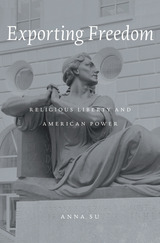
Religious freedom is widely recognized today as a basic human right, guaranteed by nearly all national constitutions. Exporting Freedom charts the rise of religious freedom as an ideal firmly enshrined in international law and shows how America’s promotion of the cause of individuals worldwide to freely practice their faith advanced its ascent as a global power.
Anna Su traces America’s exportation of religious freedom in various laws and policies enacted over the course of the twentieth century, in diverse locations and under a variety of historical circumstances. Influenced by growing religious tolerance at home and inspired by a belief in the United States’ obligation to protect the persecuted beyond its borders, American officials drafted constitutions as part of military occupations—in the Philippines after the Spanish-American War, in Japan following World War II, and in Iraq after 2003. They also spearheaded efforts to reform the international legal order by pursuing Wilsonian principles in the League of Nations, drafting the United Nations Charter, and signing the Helsinki Accords during the Cold War. The fruits of these labors are evident in the religious freedom provisions in international legal instruments, regional human rights conventions, and national constitutions.
In examining the evolution of religious freedom from an expression of the civilizing impulse to the democratization of states and, finally, through the promotion of human rights, Su offers a new understanding of the significance of religion in international relations.

Social media compile data on users, retailers mine information on consumers, Internet giants create dossiers of who we know and what we do, and intelligence agencies collect all this plus billions of communications daily. Exploiting our boundless desire to access everything all the time, digital technology is breaking down whatever boundaries still exist between the state, the market, and the private realm. Exposed offers a powerful critique of our new virtual transparence, revealing just how unfree we are becoming and how little we seem to care.
Bernard Harcourt guides us through our new digital landscape, one that makes it so easy for others to monitor, profile, and shape our every desire. We are building what he calls the expository society—a platform for unprecedented levels of exhibition, watching, and influence that is reconfiguring our political relations and reshaping our notions of what it means to be an individual.
We are not scandalized by this. To the contrary: we crave exposure and knowingly surrender our privacy and anonymity in order to tap into social networks and consumer convenience—or we give in ambivalently, despite our reservations. But we have arrived at a moment of reckoning. If we do not wish to be trapped in a steel mesh of wireless digits, we have a responsibility to do whatever we can to resist. Disobedience to a regime that relies on massive data mining can take many forms, from aggressively encrypting personal information to leaking government secrets, but all will require conviction and courage.

A sharp exposé of the roots of the cost-exposure consensus in American health care that shows how the next wave of reform can secure real access and efficiency.
The toxic battle over how to reshape American health care has overshadowed the underlying bipartisan agreement that health insurance coverage should be incomplete. Both Democrats and Republicans expect patients to bear a substantial portion of health care costs through deductibles, copayments, and coinsurance. In theory this strategy empowers patients to make cost-benefit tradeoffs, encourages thrift and efficiency in a system rife with waste, and defends against the moral hazard that can arise from insurance. But in fact, as Christopher T. Robertson reveals, this cost-exposure consensus keeps people from valuable care, causes widespread anxiety, and drives many patients and their families into bankruptcy and foreclosure.
Marshalling a decade of research, Exposed offers an alternative framework that takes us back to the core purpose of insurance: pooling resources to provide individuals access to care that would otherwise be unaffordable. Robertson shows how the cost-exposure consensus has changed the meaning and experience of health care and exchanged one form of moral hazard for another. He also provides avenues of reform. If cost exposure remains a primary strategy, physicians, hospitals, and other providers must be held legally responsible for communicating those costs to patients, and insurance companies should scale cost exposure to individuals’ ability to pay.
New and more promising models are on the horizon, if only we would let go our misguided embrace of incomplete insurance.
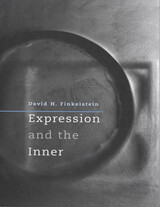
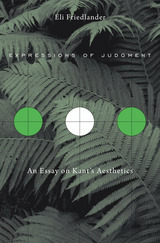
The Critique of Judgment—the third and final work in Kant’s critical system—laid the groundwork of modern aesthetics when it appeared in 1790. Eli Friedlander’s reappraisal of this seminal accomplishment reformulates and elucidates Kant’s thought in order to reveal the inner unity of the Third Critique.
Expressions of Judgment emphasizes the internal connection of judgment and meaning in Kant’s aesthetics, showing how the pleasure in judging is intimately related to our capacity to draw meaning from our encounter with beauty. Although the meaningfulness of aesthetic judgment is most evident in the response to art, the appreciation of nature’s beauty has an equal share in the significant experience of our world. Friedlander’s attention to fundamental dualities underlying the Third Critique—such as that of art and nature—underscores how its themes are subordinated systematically to the central task Kant sets himself: that of devising a philosophical blueprint for the mediation between the realms of nature and freedom.
This understanding of the mediating function of judgment guides Friedlander in articulating the dimensions of the field of the aesthetic that opens between art and nature, the subject and the object, knowledge and the will, as well as between the individual and the communal. Expressions of Judgment illuminates the distinctness as well as the continuity of this important late phase in Kant’s critical enterprise, providing insights for experienced scholars as well as new students of philosophy.
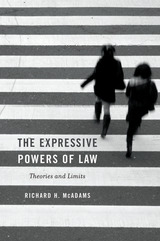
When asked why people obey the law, legal scholars usually give two answers. Law deters illicit activities by specifying sanctions, and it possesses legitimate authority in the eyes of society. Richard McAdams shifts the prism on this familiar question to offer another compelling explanation of how the law creates compliance: through its expressive power to coordinate our behavior and inform our beliefs.
“McAdams’s account is useful, powerful, and—a rarity in legal theory—concrete…McAdams’s treatment reveals important insights into how rational agents reason and interact both with one another and with the law. The Expressive Powers of Law is a valuable contribution to our understanding of these interactions.”
—Harvard Law Review
“McAdams’s analysis widening the perspective of our understanding of why people comply with the law should be welcomed by those interested either in the nature of law, the function of law, or both…McAdams shows how law sometimes works by a power of suggestion. His varied examples are fascinating for their capacity both to demonstrate and to show the limits of law’s expressive power.”
—Patrick McKinley Brennan, Review of Metaphysics
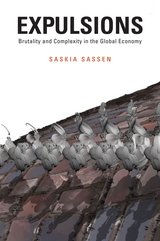
Soaring income inequality and unemployment, expanding populations of the displaced and imprisoned, accelerating destruction of land and water bodies: today’s socioeconomic and environmental dislocations cannot be fully understood in the usual terms of poverty and injustice, according to Saskia Sassen. They are more accurately understood as a type of expulsion—from professional livelihood, from living space, even from the very biosphere that makes life possible.
This hard-headed critique updates our understanding of economics for the twenty-first century, exposing a system with devastating consequences even for those who think they are not vulnerable. From finance to mining, the complex types of knowledge and technology we have come to admire are used too often in ways that produce elementary brutalities. These have evolved into predatory formations—assemblages of knowledge, interests, and outcomes that go beyond a firm’s or an individual’s or a government’s project.
Sassen draws surprising connections to illuminate the systemic logic of these expulsions. The sophisticated knowledge that created today’s financial “instruments” is paralleled by the engineering expertise that enables exploitation of the environment, and by the legal expertise that allows the world’s have-nations to acquire vast stretches of territory from the have-nots. Expulsions lays bare the extent to which the sheer complexity of the global economy makes it hard to trace lines of responsibility for the displacements, evictions, and eradications it produces—and equally hard for those who benefit from the system to feel responsible for its depredations.

An Observer Architecture Book of the Year
Soaring income inequality and unemployment, expanding populations of the displaced and imprisoned, accelerating destruction of land and water bodies: today’s socioeconomic and environmental dislocations cannot be fully understood in the usual terms of poverty and injustice, according to Saskia Sassen. They are more accurately understood as a type of expulsion—from professional livelihood, from living space, even from the very biosphere that makes life possible.
“Saskia Sassen’s Expulsions describes the global forces that make ever more tenuous and fragile most people’s grip on the places where they live.”
—Rowan Moore, The Observer
“Coupled with her earlier work, this may be a paradigm breaking/making work.”
—Michael D. Kennedy, Contemporary Sociology
“Once again, sociologist Sassen uses her considerable knowledge to think creatively at both the local and global levels…In place of the principle of inclusion in the pre-1980s Keynesian era, the planet is increasingly dominated by a principle of exclusion of people, land, natural resources, and water. Sassen presents a powerful conceptual analysis and an equally powerful and timely call to action.”
—M. Oromaner, Choice



Every year hundreds of defendants are convicted on little more than the say-so of a fellow citizen. Although psychologists have suspected for decades that an eyewitness can be highly unreliable, new evidence leaves no doubt that juries vastly overestimate the credibility of eyewitness accounts. It is a problem that the courts have yet to solve or face squarely.
In Eyewitness Testimony, Elizabeth Loftus makes the psychological case against the eyewitness. Beginning with the basics of eyewitness fallibility, such as poor viewing conditions, brief exposure, and stress, Loftus moves to more subtle factors, such as expectations, biases, and personal stereotypes, all of which can intervene to create erroneous reports. Loftus also shows that eyewitness memory is chronically inaccurate in surprising ways. An ingenious series of experiments reveals that memory can be radically altered by the way an eyewitness is questioned after the fact. New memories can be implanted and old ones unconsciously altered under interrogation.
These results have important implications for court reform, police interrogation methods, defense strategy, and many other aspects of criminal and civil procedure. Eyewitness Testimony is a powerful book that should be required reading for trial lawyers, social psychologists, and anyone who considers the chilling prospect of confronting an eyewitness accusation in a court of law.

Every year hundreds of defendants are convicted on little more than the say-so of a fellow citizen. Although psychologists have suspected for decades that an eyewitness can be highly unreliable, new evidence leaves no doubt that juries vastly overestimate the credibility of eyewitness accounts. It is a problem that the courts have yet to solve or face squarely.
In Eyewitness Testimony, Elizabeth Loftus makes the psychological case against the eyewitness. Beginning with the basics of eyewitness fallibility, such as poor viewing conditions, brief exposure, and stress, Loftus moves to more subtle factors, such as expectations, biases, and personal stereotypes, all of which can intervene to create erroneous reports. Loftus also shows that eyewitness memory is chronically inaccurate in surprising ways. An ingenious series of experiments reveals that memory can be radically altered by the way an eyewitness is questioned after the fact. New memories can be implanted and old ones unconsciously altered under interrogation.
These results have important implications for court reform, police interrogation methods, defense strategy, and many other aspects of criminal and civil procedure. Eyewitness Testimony is a powerful book that should be required reading for trial lawyers, social psychologists, and anyone who considers the chilling prospect of confronting an eyewitness accusation in a court of law.


READERS
Browse our collection.
PUBLISHERS
See BiblioVault's publisher services.
STUDENT SERVICES
Files for college accessibility offices.
UChicago Accessibility Resources
home | accessibility | search | about | contact us
BiblioVault ® 2001 - 2024
The University of Chicago Press









